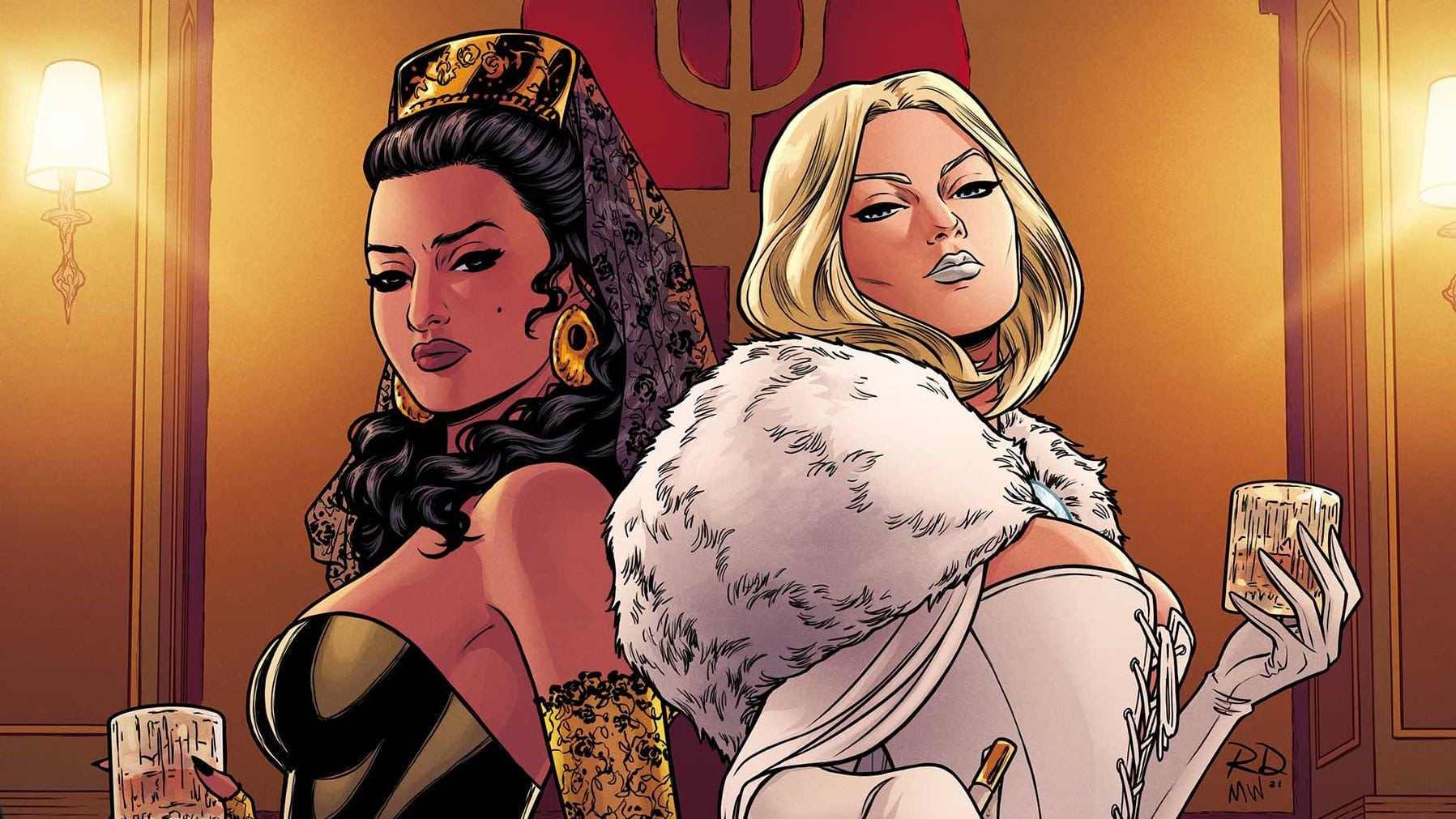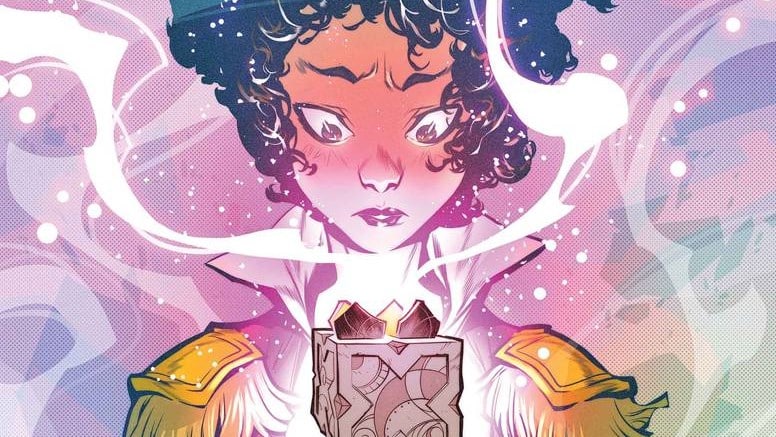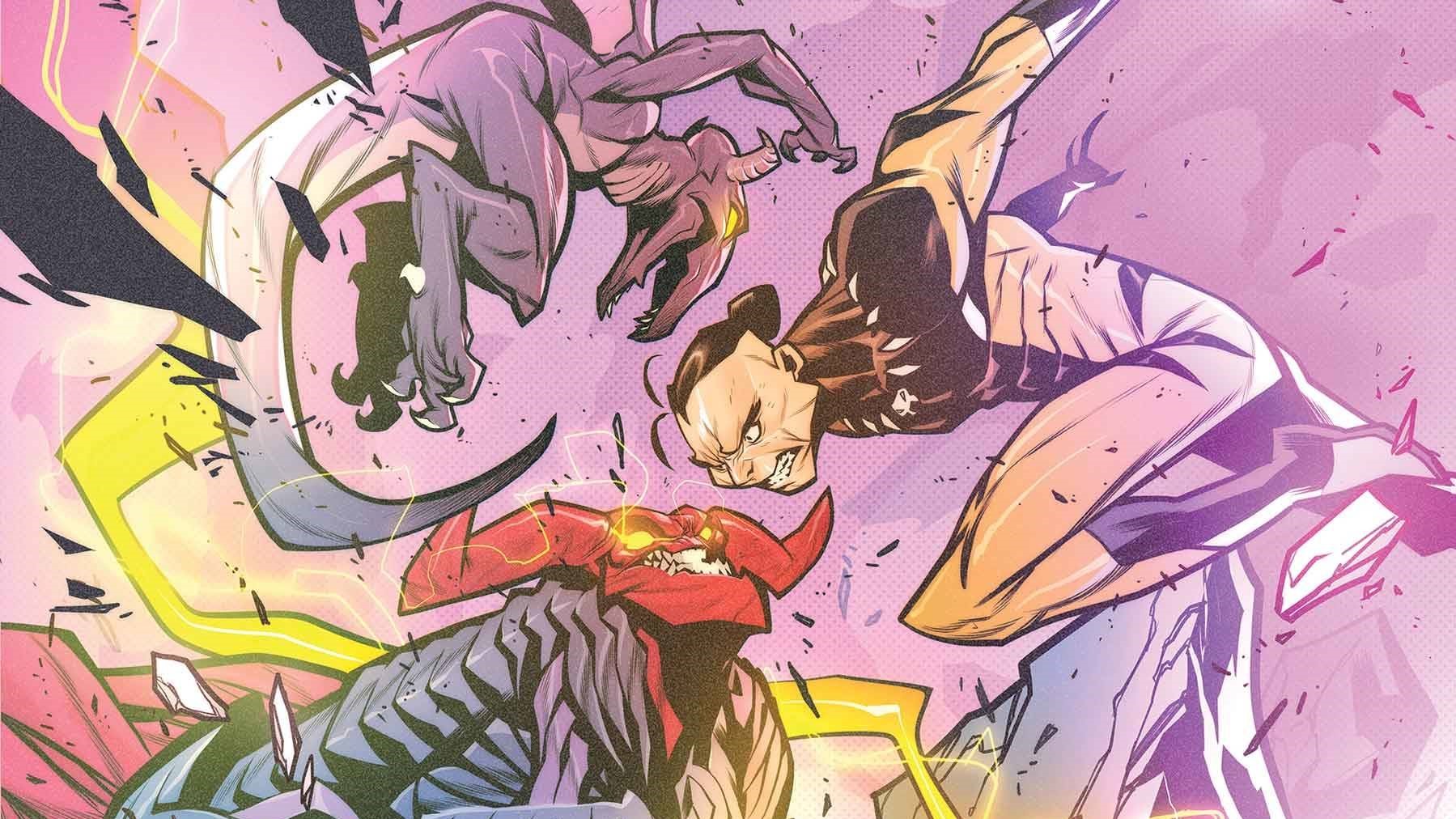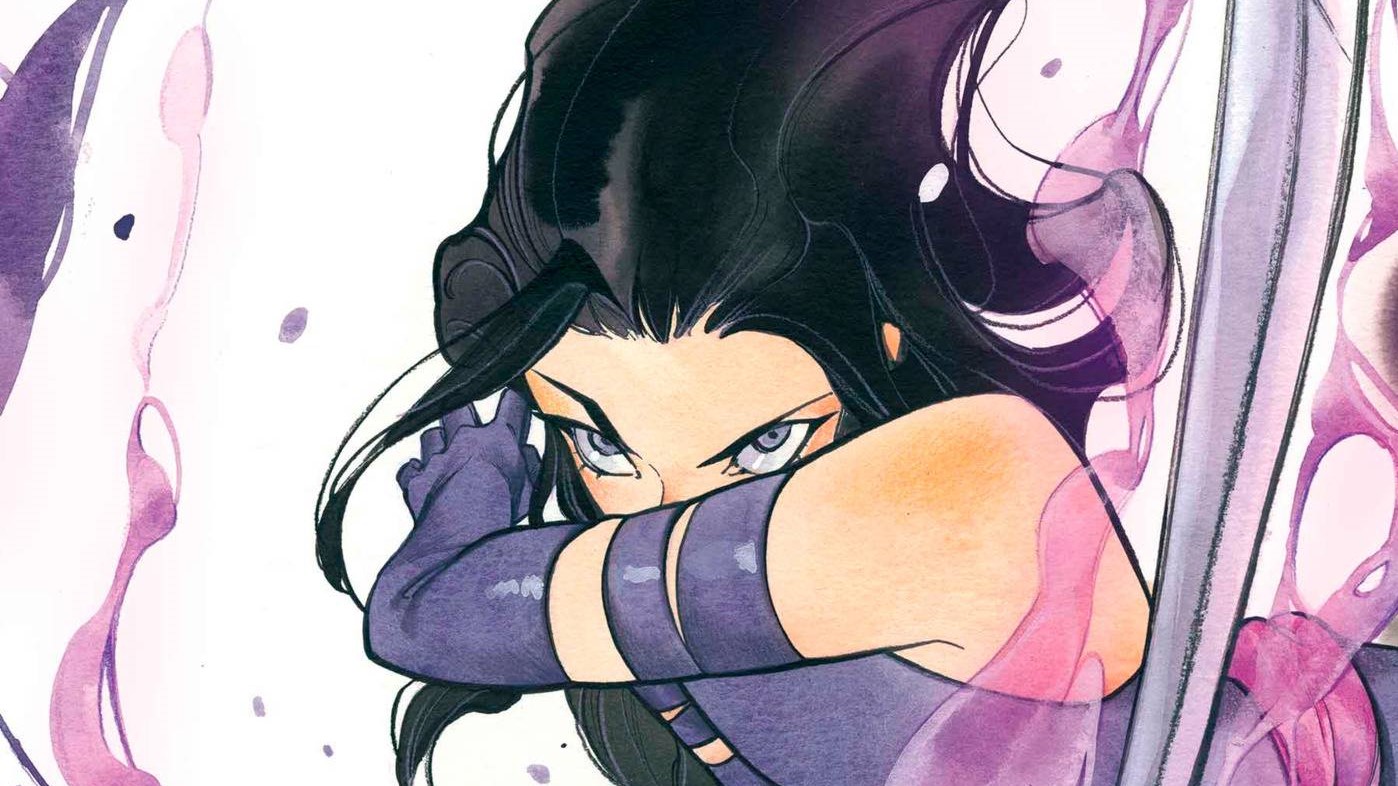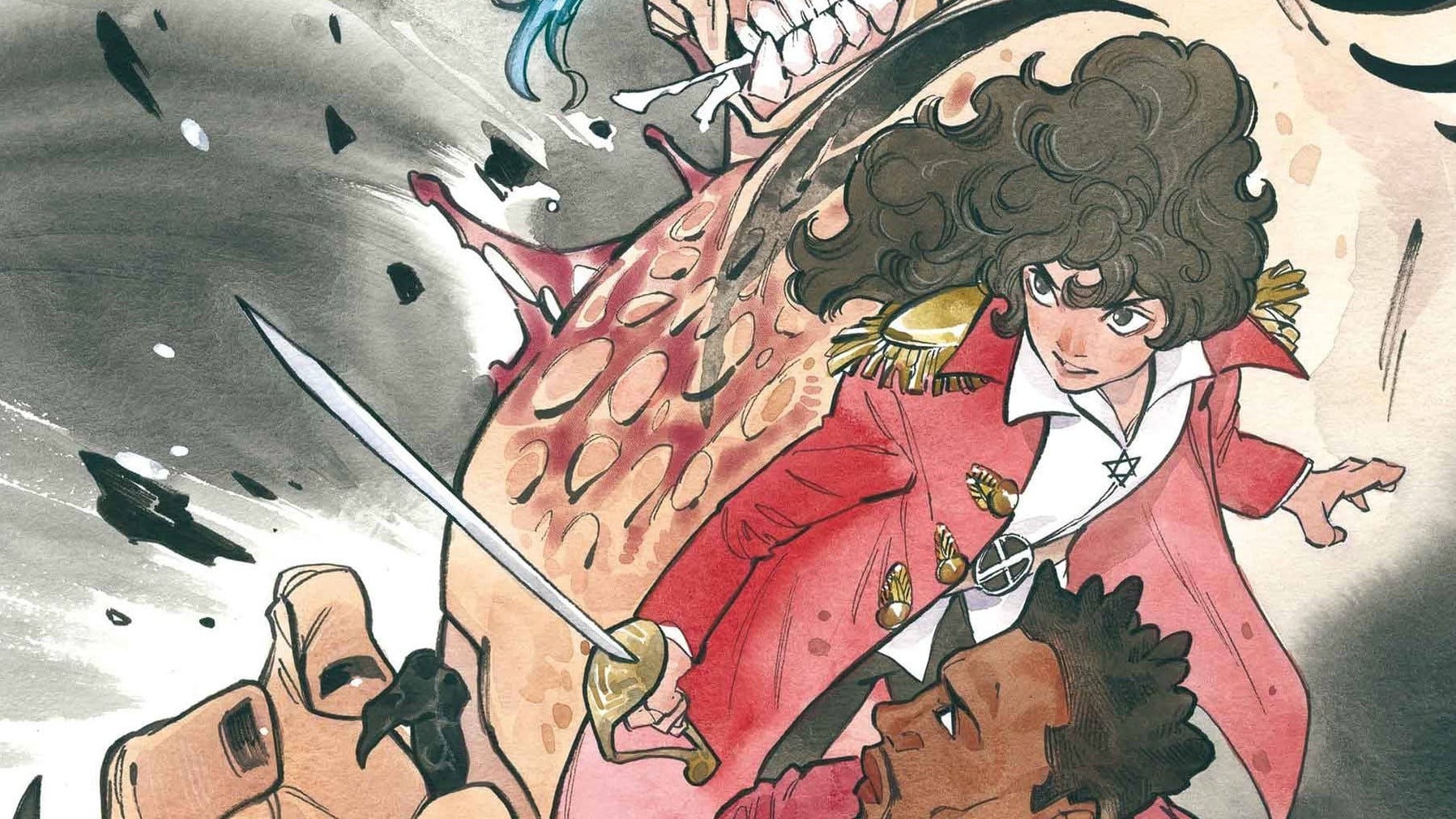The Gala is over but the Hellfire Trading company has to deal with the repercussions in Marauders #22 by Gerry Duggan, Matteo Lolli, Klaus Janson, Rain Beredo and Cory Petit.
[Ed. note: This article involves a discussion of domestic abuse and sexual assault.]
Ian Gregory: We’re taking our first steps into a brave post-Hellfire Gala world here in Marauders #22. And while we get some nods to the major events of the Gala, the focus is on the plots set up beforehand. Andrea! Thanks for joining me to talk Marauders this week.
Andrea Ayres: Thanks for having me! I could never hope to fill Christi’s shoes, but I will do my best to be a suitable substitute. This is our first time writing together, and what an issue for our maiden voyage. There’s a lot to discuss, and I have demons that need exorcising, so let’s get to it.
Wilhelmina

Ian: We get a single literal page recapping the significant events of the Hellfire Gala – Mars, Scarlet Witch, etc. Here, the real meat is on two mostly unrelated stories: Wilhelmina Kensington and Lourdes Chantel. This Wilhelmina plot first came up in the Gala in just a few brief panels, where the Cuckoos reached into her mind to help her “remember who she is.” I, and a lot of other people who read this issue, read it as the Cuckoos, perhaps revealing that Wilhelmina was a repressed mutant of some kind. Instead, as this issue reveals, they, uh, cured her sociopathy? Is that… does that… can they just do that? I feel like if psychics could just flip those switches, it would have solved many problems for the X-Men over the years. It also raises several strange side issues. What are your thoughts on this, Andrea?
Andrea: Well, it’s not great, Ian! First, there is the juxtaposition of the dead body of Scarlet Witch against the very much alive bosom of Emma Frost. That whiplash is a constant theme of the issue. We’re vacillating between gender-based violence to images of sexuality and desire. It happens so frequently that a casual reader may find it difficult to know there’s a difference between the two. Yeah, I’ll have more to say on this later.
Back to Wilhelmina. As you said, the Cuckoos claim to have “fixed” her. Of course, she is not “fixed” at all. This issue features every kind of storyline I dislike in comics—a cake of absolute crap. The wording is also troubling. The simplistic explanation of the Cuckoos just flipping switches in Wilhelmina’s mind is elementary. I don’t even know quite where to begin. It’s so odd to me to see this cliched woman in a torn dress (of course) pulling at her hair and crying like the literal vision of hysteria (Which The Nib did a good overview of). I haven’t even started to get into why Wilhelmina appears to have suffered her mental health crisis to begin. For that, I’m going to turn it over to you while I collect myself.
Ian: I mean, at least they had the decency to put “fixed” in quotation marks. There’s a soft implication that the Cuckoos were misbehaving by doing this to Wilhelmina, but it’s not really for the reasons that you’re outlining here. It does feel particularly trite that the ghosts of all the animals surround her. The implication Wilhelmina is this way is she is abused by her father. By “fixing” her, Wilhelmina’s mentally reduced to a childlike state – either she’s reliving her trauma, or this is a literal infantilization.
Like you, I find this plotline to be distasteful at best. It feels archaic and bizarre, made even worse by the fact that this story feels totally unnecessary. I know that the modern Hellfire Club has been all over this series, and those kids are almost entirely interchangeable, so maybe this is an attempt to add texture to the villains? If so, it’s wildly ill-advised and isn’t rapidly endearing me to Wilhelmina. If Duggan’s best idea to make Wilhelmina more interesting is to make her a 19th-century psychiatric patient, I’m worried about what he’ll try for the rest of them.
Briefly, I also want to agree with you on the contrasting depictions of the Scarlet Witch and Emma Frost. It doesn’t help that Wanda looks like she’s in the middle of a nice woodland nap. Her body splayed in an optimally sexualized condition. You have a chance to make some nice visual contrast between Wanda and Emma (Emma drinks on the beach while Wanda has been murdered). Instead, they’re just both hot women.
Andrea: My concern with Marauders #22 is the constant pronouncements of women helping women, especially with all these men around! It situates women’s locus of power on men. Women exist seemingly as a response to men and what they will have or can do to them.
The Cuckoos make an offhand remark that they will clean up the mess. They imply they are doing so mostly for the murdered cats, but for Wilhelmina too! There’s a time for humor, and this joke just felt in poor taste. The flippant joke, especially given we’re about to see images related to implied child abuse, left me deeply uncomfortable. It feels so bungled from start to finish.
Referring to the scene in question, Wilhelmina says, “I’m scared.” The Cuckoos tell her not to be because she isn’t really there. Everything she’s afraid of has already happened, so nothing to fear! The script here feels like it comes from someone who may not have a good enough grasp on sexual or gender-based violence to write about it.
A flashback is a kind of PTSD response. It does not much care if you are actually in the environment or the moment when the violence occurred. For someone experiencing a flashback, the event is happening. It is a complete sensory, physical, and emotional experience. So either Wilhelmina is forced to have a flashback she’s not prepared for, or she has been brought back to be retraumatized. These topics required sensitivity of the highest order. I do not know if Marvel utilized their in-house sensitivity readers. If they did, it is hard to imagine some of these concerns not being flagged. It’s certainly something I’d like to follow up about.
That’s not even to get into how the introduction of child sexual assault is never dealt with? The image of a man’s hand on her door hangs there in the panel. It is left to leave an acrid taste in the mouth. The Cuckoos call him a “bad daddy.” This isn’t just an instance of a bad dad. We aren’t talking about neglecting to go to a soccer match. The language dismisses the severity of the crime. Victims and survivors of assault prefer to use proper terminology so as not to obfuscate or diminish the crime of the abuser. The proper application of language is fundamental. You can read more about the importance of using the appropriate language regarding child abuse in the guide I linked to from Unicef. Alas, I need to stop before I take up even more space.
Ian: I think you’re exactly right. The bottom line is that this is a gratuitous, thoughtless sequence that doesn’t need to be here. Thanks for walking us through pretty much every angle on why this doesn’t work.
Lourdes

Ian: The second half of this issue is essentially a giant retcon to the Lourdes Chantel Classic X-Men story reprinted in Marauders #21. Back then, we only had the cover of this issue to go on, and we were pretty excited at the return of Lourdes. Here was an exciting character from X-Men history who had essentially been fridged in her first and only appearance and would now get a second chance in the Krakoa era. I thought this was a pretty great choice. Despite Lourdes’ thin background, she has many powerful plot elements working in her favor: a former lover of Shaw, a teleporter (especially relevant for mutant circuits like in SWORD), and an original Hellfire Club member who could provide outsider context on advancements in mutantdom.
Instead, this issue goes out of its way to take Lourdes off the table. Just as with the Wilhelmina story, why is this here? Do we really need another account establishing that Shaw is a terrible person? (In fact, isn’t that the point of, like, the first fifteen issues of this series?) It does provide some new backstory on Emma, but I can’t help but dislike how the story’s focus is not on Lourdes herself but Emma and Shaw. It feels like this is such a misdirected story that neither moves our characters forward in a significant way nor introduces a new plot element or character. What are we doing here?
Andrea: To answer your question, I don’t know.
As you said, Lourdes is first introduced in the 1987 Classic X-Men issue “Out with the Old,” written by Chris Claremont. In that story, Lourdes exists primarily as a means for Sebastion Shaw to experience character growth. Lourdes is killed by Ned Buckman’s Sentinels defending Shaw. Lourdes, the 2021 retcon, doesn’t fare a helluva lot better. Though hey, at least she is alive! Unfridging someone only to once again position their character as a response to gender-based violence is not as progressive as this book thinks it is.
Marauders #22 continues to state the equivalent of “Us Girls Have to Stick Together!” The words “We need to look out for other women when men take advantage” exist on the page. So women only need to check in on other women because men are assholes? I promise people can support other people without basing it on the oppression they fear from others. That is not to say it isn’t a consideration, but it does not require explicit calling out. Women don’t say these phrases to one another because it’s endemic to existing.
Then we have Lourdes and her black eye from Shaw. “He was so charming when we first met.” Yes, yes, and he can only grow if you die. Your concerns regarding his membership to the Hellfire Club mean nothing if you are alive. Emma helps Lourdes cover her black eye with make-up. It is almost amusing—a dot of concealer to cover the violence and a giant helping of third-wave feminism is a great logline for this particular book. Instead of, you know, “The Morning After” which is too on the nose. It’s all too much.
It’s not that there aren’t some potentially interesting concepts with Emma, Wilson Fisk (Kingpin), and Lourdes introduced. The secret of Lourdes being alive all this time is enabled by Fisk. This does introduce a possibly interesting wriggle. At the very least, there’s some new material to unearth. It is undone by the hamstring introduction of the Lourdes storyline. What do you think about the possibility of further exploration of Fisk and Lourdes, anything salvageable on that end?
Ian: I still think Lourdes is an interesting character opportunity for all the reasons I listed above, but she’s still essentially just an opportunity. In the last two pages of this flashback, where Emma is arranging Lourdes’ future, she just stands silently in the background and smiles. We get almost nothing on Lourdes’ personality, and all we know is that she vaguely believes “in mutantdom.” That’s what makes this issue sting so much: Lourdes isn’t a real character, just dressing on the backstory of Sebastian and Emma. Like you said: there’s a veneer of solidarity without any actual substance. Emma “helps” Lourdes, but Lourdes has no say in that help and no opinions on the matter.
The Fisk-Emma connection is certainly interesting, and given the underworld-business focus of Marauders, I find it likely that it comes up again soon. But is that really what we need in this book? Our criticisms of Marauders in the lead-up to the Gala was that it didn’t have anywhere to go. Now the Gala is over, and we went nowhere fast. I could forgive the directionless nature of the book more if I felt like we were getting meaningful character work, but we aren’t.
I’m of two minds on Emma’s depiction in this series. At first, Emma’s direction in the Krakoa era seems to be centered “One more time, for the children,” but in Marauders, she’s not interacting with any kids. Instead, here we get her vindictive and business-minded side. This is the side that naturally draws out flashbacks to her less-than-good original Hellfire Club era (the Emma who blows up children’s ponies), but I would appreciate a little more contrast on how she used to be and how she is now. I’m also not sure I buy her statement that “Krakoa is worth almost any sacrifice.” Has she always been such a Krakoa lifer? I always saw Emma as someone with personal ideals and preferences above that of “the dream.”
Andrea: I appreciate the points you raise. I’m glad you bring up Emma’s comment about Krakoa being worth any sacrifice. It’s a haunting statement. I can’t help but consider white women’s history with holding up oppressive regimes in advance of, or for their protection, at the cost of all others. The line doesn’t sit well with me. Not that I turn to Frost for my morals, but given the issue touts feminist credentials so frequently, it’s difficult not to draw the contrast. It’s also just an incredibly odd characterization for Emma. I can’t square it with, you know, most of her entire history. Any final thoughts?
Ian: Okay, well, that’s the issue. Marauders is still floundering, and it feels like every week since I’ve started covering the book, there have been some colossal missteps or misguided stories. I can only hope this book gets back on track to what made it so enjoyable in the first fifteen or so issues. While I can’t say I enjoyed the overall experience, it was nice to have you join me, Andrea.
Andrea: Thank you for having me and for the great discussion of some truly unpleasant topics. Ultimately, even if the intent behind the premise of the issue is good, my interest is in outcomes. The outcome of Marauders #22 could possibly be harmful to those who have experienced gender-based or sexualized violence. At the very least, it’s not helping women in the real world or Krakoa.
X-Traneous Thoughts

- Emma’s look on page five is the only thing I will choose to remember from this issue.
- Based on the final data page, Harry Leland, the most forgotten member of the Hellfire Club will be returning. Woo?
- Struck by the deep contrast between the cover of this issue and the contents, and not in a good way.
- Krakoan Reads: MARAUD ABROAD

